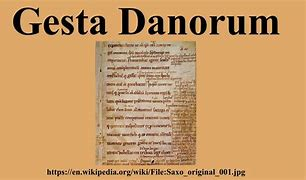Apparently, Saxo Grammaticus wrongly identified Hrolf Kraki's great-uncle Frodi with Hadding's son of the same name. Thus:
"Saxo places Hadding three generations before Hrolf Kraki." (Afterword, p. 301)
If we accepted Saxo's chronology, then we would read Poul Anderson's War Of The Gods (1997) before his Hrolf Kraki's Saga (1973). However, the latter reads like what it is, a retold saga, whereas the former reads more like a modern, although not of course contemporary, novel.
For more on chronological links between Poul Anderson's works of historical fiction and historical fantasy, see:
I have to refer to these posts to remember what all the links were.

3 comments:
Kaor, Paul!
The problem is, however, is that the chronology of the early histories of what became Norway and Denmark is uncertain and based on shaky and ambiguous sources. The earliest reliably known king of Denmark was Gorm the Old (r. c. AD 936-958/964). For Norway that was Harald Fairhair, who unified Norway by 872 and then ruled till his death in 935.
Anderson, of course, in books like HROLF KRAKI'S SAGA, had to make sense of what he found in those sources and propose reconstructions of early Danish history that he thought best fitted what he found in them.
Ad astra! Sean
Names do repeat in families. Note, however, that few English kings have been named "John" in the last 800 years...
Kaor, Mr. Stirling!
I agree! France alone has had 18 kings named "Louis," and ten named "Charles." And six named "Philip."
England had 8 kings named "Henry," and another 8 named "Edward." As for "John," I'm one of those who DON'T think King John was a monster, based on Alan Lloyd's biography THE MALIGNED MONARCH.
And you did have a "John II" as King-Emperor of the Angrezi Raj in your THE PESHAWAR LANCERS.
Ad astra! Sean
Post a Comment